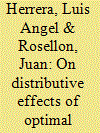| Srl | Item |
| 1 |
ID:
125717


|
|
|
|
|
| Publication |
2013.
|
| Summary/Abstract |
Benchmarking of electricity networks has a key role in sharing the benefits of efficiency improvements with consumers and ensuring regulated companies earn a fair return on their investments. This paper analyses and contrasts the theory and practice of international benchmarking of electricity transmission by regulators. We examine the literature relevant to electricity transmission benchmarking and discuss the results of a survey of 25 national electricity regulators. While new panel data techniques aimed at dealing with unobserved heterogeneity and the validity of the comparator group look intellectually promising, our survey suggests that they are in their infancy for regulatory purposes. In electricity transmission, relative to electricity distribution, choosing variables is particularly difficult, because of the large number of potential variables to choose from. Failure to apply benchmarking appropriately may negatively affect investors' willingness to invest in the future. While few of our surveyed regulators acknowledge that regulatory risk is currently an issue in transmission benchmarking, many more concede it might be. In the meantime new regulatory approaches - such as those based on tendering, negotiated settlements, a wider range of outputs or longer term grid planning - are emerging and will necessarily involve a reduced role for benchmarking.
|
|
|
|
|
|
|
|
|
|
|
|
|
|
|
|
| 2 |
ID:
114288


|
|
|
|
|
| Publication |
2012.
|
| Summary/Abstract |
This paper examines the choice, in electricity and gas systems, between having an independent system operator (ISO) and an independent transmission system operator (ITSO). Both optimise the operation of the system in real time. However ISOs do not own any electricity transmission wires or gas transmission pipes (i.e. electricity and gas systems), while ITSOs do. To examine the choice we will discuss the functions, cost structure, governance and pricing of the ISO, focussing on the US, with regard to controlling the system and operating associated power markets. We outline an ideal model for an electricity system operator and examine the extent to which system operation in the US and the UK conforms to the ideal. Finally, we look at the evolving role of system operators and how their efficiency might be evaluated. We conclude that there is much to learn from ISO experience in operating existing transmission systems.
|
|
|
|
|
|
|
|
|
|
|
|
|
|
|
|
| 3 |
ID:
132654


|
|
|
|
|
| Publication |
2014.
|
| Summary/Abstract |
To date, the distributive implications of incentive regulation on electricity transmission networks have not been explicitly studied in the literature. More specifically, the parameters that a regulator might use to achieve distributive efficiency under price-cap regulation have not yet been identified. To discern these parameters is the motivation for the research presented in this paper. We study how different weight parameters affect the distributive characteristics of optimal price-cap incentive regulation for electricity transmission. We find that a regulator×s use of ideal (Laspeyres) weights tends to be more beneficial for the Transco (consumers) than for consumers (the Transco).
|
|
|
|
|
|
|
|
|
|
|
|
|
|
|
|
| 4 |
ID:
166975


|
|
|
|
|
| Summary/Abstract |
This project probes perceptions of long-standing concern about high voltage electricity overhead transmission lines (HVOTL). Psychometric, cultural and broader risk analysis frameworks permit close examination of homeowners' worries about relevant externalities. Investigated via a telephone survey in Queensland, Australia, the most significant perceptions are hypothesized to relate to technologically-infused risks. Visual effects and noise are the key externalities but shield deeper qualms relating to electric and magnetic fields (EMFs). Safety, environmental damage and property impacts are less feared. Regression analysis indicates that prior knowledge about HVOTLs and a person's residential locale influence risk perception, along with gender and age. The research supports the underlying precepts of a ‘risk society’ while offering significant policy guidelines for infrastructure and associated agencies.
|
|
|
|
|
|
|
|
|
|
|
|
|
|
|
|
| 5 |
ID:
149970


|
|
|
|
|
| Summary/Abstract |
The integration of national electricity markets into a single European one is expected to reduce the ability of dominant players to exercise market power. This paper investigates whether or not existing transmission capacities of cross-border interconnectors are sufficient to achieve this result and create vigorous competition in the market. A model with two decision levels is used. On the first level profit maximizing generators play Cournot game against each other. On the last level the system operator clears the market and determines flows in the network to maximize social welfare subject to a set of physical constraints. As each strategic generator anticipates her impact on equilibrium prices and congestion in the system, her optimization problem is subject to equilibrium constraints from the system operator's problem.
|
|
|
|
|
|
|
|
|
|
|
|
|
|
|
|